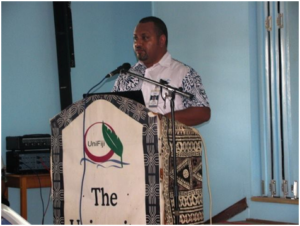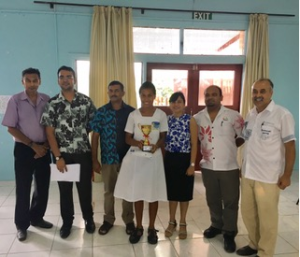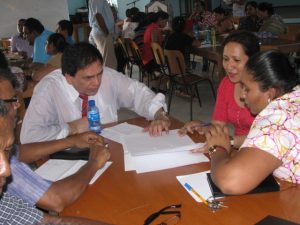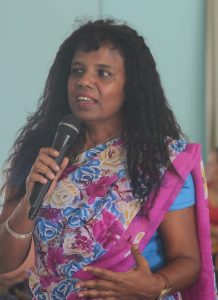Top Law Student- Gul Fatima
![]()










World Water Day is held annually on the 22nd of March as a means of focusing attention on the importance of freshwater and advocating for the sustainable management of freshwater resources.
To commemorate this day, School of Science & Technology organized World Water Day Celebrations at its Saweni Campus on Friday the 31st of March. Keynote speaker for the day was General Manager Customer Services at the Water Authority of Fiji (WAF) – Mr. Sekove Uluinayau who represented WAF on behalf of the CEO.
World Water Day celebrations this year highlighted the theme “Wastewater” and the campaign, ‘Why waste water?’ which is about reducing and reusing wastewater. Water is a shared resource and its management needs to take into account a wide variety of conflicting interests.
By inviting schools around the western division to participate in the World Water Day celebrations through the organized Oratory and Poster competitions, the University provided an opportunity for students to come together and emphasize as well as create awareness on the need for the proper management of water resources.
A total of 16 schools from around the Western division were represented during the celebrations with participating students showing exemplary skills and creativity in the Oratory contest and Poster competitions.
The University congratulates the Winners and their schools in the respective competitions and looks forward to hosting these celebrations again in the coming year.
Oratory Winner – Meresamoavi Ravula (Nawai Secondary School)
Oratory Runner-Up – Litiana Satala (St.Thomas High School)
Poster Winner – Luisa (Nadi Muslim College)
2nd Place – Xavier College
3rd Place – Saileen Prasad of Pundit Vishnu Deo Memorial College
![]()

Figure 1 Vice-Chancellor Professor Misir with staff, explaining the importance of sub-sub strategic plan.
Strategic plan is an important aspect in the University and it is vital that staff is made aware of its purpose, says Vice-Chancellor, Professor Prem Misir.
Speaking at the strategic plan evaluation training session for staff of the University, Prof Misir highlighted different aspects of strategic planning and how these aspects will help develop a better sub-strategic or sub-sub-strategic plan.
“It’s really a way of trying to show the location of the evaluation process and that location is ground zero. Many people think that the strategic plan is evaluated but instead it is the specific plans which come under the sub-sub strategic plans, which is evaluated. We are trying to find out whether there is a coordinated link among the strategic priorities, goals, objectives (which need to measurable), strategies, Key Point Indicators (KPIs) and the targets,” he said.
Mr Neeraj Sharma, of the Computer Science and IT Department said that it was important to know how to create a sub-strategic or sub-sub-strategic plan as this would act as a to-do-list where in 5 years, one should forecast where the department or school would stand.
“Another important aspect highlighted by the VC was in regards to reviewing, usually, strategic plans are reviewed on a quarterly basis but since this is a new initiative it is important to review it on a monthly basis to see the progress of the goals set out,” he commented.
He further stated that the workshop was quite helpful in guiding them to creating the sub-strategic and sub-sub strategic plans using the right matrix.
“It is important to follow the outline in order of the strategic priority as this will highlight the important things that need to be achieved within the 5 year period,” he said.
Ms Sanjaleen Prasad said that the deliberation created awareness on the 3 key challenges confronting higher education, that is, impact of new communication, research and teaching technologies, the need to change the traditional academic structure and seeking adaptive and flexible links between the University, industry and the economy.
“The sub strategic plan can be further modified to incorporate the three pillars mentioned and these are interdisciplinary, internalization and academic industry collaboration. The School and Department Strategic Plans can focus on these and provide a pathway towards achieving these for the University to flourish and grow further in the next five years,” she explained.
After the discussion it was decided that there would be monthly evaluations of the sub-strategic and sub-sub strategic plans.
![]()
The University of Fiji recognizes the importance of climate change adaptation and mitigation and Fiji’s Presidency at COP23 and has therefore devised a plan in the lead up to COP23 in November.
Ms Priyatma Singh, from the Department of Science at the University of Fiji said that one of the key priorities of the University was to create awareness on the important role of Fijian Government in addressing the vulnerability of Small Island Developing States to Climate related risks.
“As a University our role would be to promote the two major events (COP23 and United Nations Oceans Conference on Sea and Oceans) and create awareness especially since Fiji assumes presidency at COP23 in Bonn, Germany,” she said.
She further stated that the School of Science and Technology plans to hold events on a monthly basis in the lead up to COP23.
“We will try to host small interactive student seminar sessions building up to COP 23 every month beginning from 10th of April. Some of the probable seminar topics discussed would include: Climate Change Reality for Pacific Island Nations – Role of Fijian Government at COP 23 ( To be facilitated by a government official); Oceans & Climate Change -( Facilitators – PIDF and The University of Fiji );Climate Change Research at the University of Fiji – (Facilitators – Department of Science and The University of Fiji PACAM project team); Climate change Adaptation and Mitigation (Facilitators – One of the NGO’s ),” she explained.
The University also had a small presentation last Friday during the World Water Day where we informed University and high school students about COP 23.
Following is a plan initiated by the Department of Science for awareness on COP23:
![]()

Figure 1 Co-Chair- Industrial Collaboration, Communication and Documentation of KBDCU conference, Dr Ajantha Perera.
The Knowledge Based Development Conference of Unifiji (KBDCU) scheduled for the 6th of May 2017 is a solution based conference says Technical and Research Officer of the Vice Chancellor’s office at UniFiji, Dr Ajantha Perera, who is also the Co-Chair- Industrial Collaboration, Communication and Documentation of KBDCU.
“It’s a solution based conference in terms of teamwork; the research done by one person can’t solve all the problems so that’s why the research work of everyone is put together in one forum so that people can listen to each other and use the acquired knowledge for development,” she explained.
The KBDCU is a conference where academics as well as the corporate and government sectors could come together to discuss about the development of the country.
“For developing countries like Fiji, it is vital that academics and researchers, who are at the Universities, assist in the development program thus contribute towards development of Fiji as a nation, it needs the knowledge that is available from sciences, arts, music, literature, engineering and technology to come together so that they can prepare an action plan, prepare certain strategies, and how they could contribute to the development of the country,” she explained.
The conference would be divided into two parts where the first half (in the morning) would see discussion between academics from USP, FNU and UniFiji and the second half where the discussion would be expanded to the corporate sector.
“We would be inviting people from the different Universities (UniFiji, USP and FNU) and the corporate sector to come together to discuss about the research that is being done already. First half of the conference, which is the morning session would see a presentation of 40 papers from academic from USP, FNU and UniFiji,” she stated.
“In the afternoon we would be bringing the corporate sector to discuss with the research paper presenters as to how the corporate sector would like to liaise with the academic sector to take the research further and what they could use from the findings for their own development work as well as the development of the country,” she commented.
The University would like to humbly invite corporate sector from all works, NGOs, Government sectors, foreign sectors, academics as well as students to attend the conference.
KBDCU would be hosted at the University of Fiji Saweni campus on May 6, 2017.
![]()